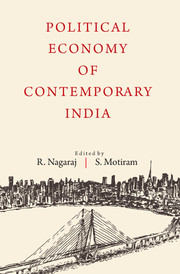Book contents
- Frontmatter
- Contents
- List of Tables and Maps
- List of Figures and Pictures
- Preface
- 1 Introduction: From ‘Intermediate Regime’ to Crony Capitalism
- Economy-wide Considerations
- Political Economy by Regions of India
- 4 Political Economy of a Dominant Caste
- 5 Populism and Party: Society Developmental Regimes in Tamil Nadu and West Bengal
- 6 India's Agricultural Development: A Regional Perspective
- Urban Labour Markets
- Land and Rural Labour
- About the Contributors
- Index
4 - Political Economy of a Dominant Caste
from Political Economy by Regions of India
Published online by Cambridge University Press: 08 February 2018
- Frontmatter
- Contents
- List of Tables and Maps
- List of Figures and Pictures
- Preface
- 1 Introduction: From ‘Intermediate Regime’ to Crony Capitalism
- Economy-wide Considerations
- Political Economy by Regions of India
- 4 Political Economy of a Dominant Caste
- 5 Populism and Party: Society Developmental Regimes in Tamil Nadu and West Bengal
- 6 India's Agricultural Development: A Regional Perspective
- Urban Labour Markets
- Land and Rural Labour
- About the Contributors
- Index
Summary
Introduction
This paper attempts to situate the multiple crises facing the Maratha community of Maharashtra in the context of state's political economy. This may have resonance to the situation of intermediate castes in other parts of India, which too find themselves at the intersection of democracy and development. A dominant, intermediate peasantry caste that assumed control of the state's political apparatus in the fifties, the Marathas ordinarily resided politically within the Congress fold and thus facilitated the continued domination of the Congress party within the state. Maratha politics of dominance and Congress politics in Maharashtra went hand in hand. However, Maratha politics has been in flux since the nineties. The long surviving, complex pattern of Maratha dominance is challenged in several ways. One part of the challenge consisted of the threat of loss of Maratha hegemony and consequent loss of leadership of the non-Maratha backward communities, the OBCs. The other challenge pertained to the inability of different factions of Marathas to negotiate peace and ensure their combined domination through power sharing. And the third was the internal crisis of disconnect between political elite and the Maratha community which further contributes to the loss of hegemony.
The present paper is divided in four parts. First part describes the multiple crises of the Marathas and their political fallout; the second part analyzes the discourse of backwardness and the demand for reservations for the Maratha community; the third part is woven around the issue of stratification within the community and in the fourth part we discuss the larger context in which the crisis of ‘dominant castes’ in various parts of India might obtain.
Multiple Crises of the Marathas
A conservative estimate of its numerical strength places the Maratha–Kunbi caste cluster at around 31 per cent of the state's population. In terms of status, it is a highly stratified caste cluster centering on peasant cultivators but reaching up to rich farmers, feudal aristocrats and rulers. Earlier studies of Maratha dominance in Maharashtra (Lele, 1982 and 1990; Vora, 1994, 2003 and 2009) have amply documented how Maratha dominance emerged as a combination of numerical preponderance, patterns of landownership and a historically nurtured sense of identity that was systematically appropriated by the Congress party in the pre- and the post-independence period.
- Type
- Chapter
- Information
- Political Economy of Contemporary India , pp. 77 - 97Publisher: Cambridge University PressPrint publication year: 2016
- 1
- Cited by



